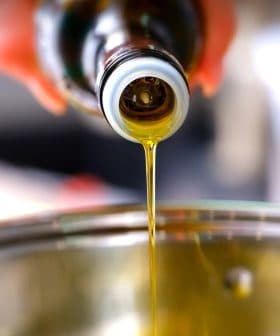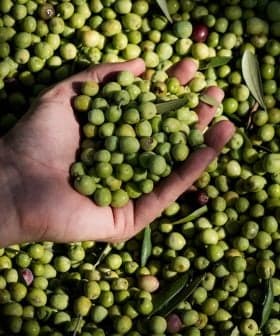Want Healthier Eggs? Feed Hens EVOO
Researchers at the University of Bari’Aldo Moro in Italy conducted a study on laying hens to determine if including extra virgin olive oil in their diets would influence egg quality and yolk cholesterol levels, finding that eggs from hens fed high polyphenol EVOO had lower cholesterol content and a better fatty acid profile. The study, published in the journal Lipids in Health and Disease, suggests that feeding hens a diet rich in polyphenol EVOO could lead to the production of healthier eggs that may be beneficial for human health.
Eggs are a breakfast staple for most people. Although an excellent source of protein, people with high cholesterol levels, heart disease or diabetes often avoid eating eggs because high cholesterol content of egg yolk is believed to raise blood cholesterol levels.
So what if eggs could be lower in saturated fat and cholesterol? Several studies conducted on fat intake of hens have shown that the type of dietary fat influences lipid composition of egg yolks. In one such study, hens fed soybean oil had egg yolks with a higher content of omega‑6 polyunsaturated fatty acids; while those fed linseed oil had a higher content of omega‑3 polyunsaturated fatty acids.
Based on results of past studies and the fact that polyphenols in extra virgin olive oil provide protection against heart disease, researchers at the University of Bari’Aldo Moro’ in Italy decided to includeextra virgin olive oil in the diets of laying hens to determine if it would influence egg quality.
The study, published in the February 2015 issue of the journal Lipids in Health and Disease, evaluated the effects of dietary supplementation of hen feed withextra virgin olive oil from two different olive cultivars with different polyphenol content on egg quality and egg yolk cholesterol.
In a first of its kind study, researchers divided 150 laying hens into three groups and fed them a normal wheat and soybean meal that differed only in the source of oil for 10 weeks.
All feeds contained 2.5 percent of oil as either sunflower oil for the control or first group;extra virgin olive oil with low polyphenol content of 38 mg/kg from the Cima di Bitonto variety for the second group; andextra virgin olive oil that contained a high content of polyphenols of 254 mg/kg from the Coratina variety for the third group of hens.
Egg laying rate, egg weight and egg shell quality were similar in hens of all three groups. The amount of polyphenols in the feed, however, was found to influence egg yolk color score, which was lowest in eggs from hens fed sunflower oil and highest in eggs from hens fedextra virgin olive oil with high polyphenol content.
Similarly, hens fed high polyphenolextra virgin olive oil laid eggs that had lower total yolk cholesterol levels than hens fed low polyphenol extra virgin olive oil. The total cholesterol content of egg yolk decreased by 4.04 percent in hens fed low polyphenol EVOO, while it decreased by 6.74 percent in hens fed high polyphenolextra virgin olive oil when compared to cholesterol levels in egg yolks from the control group.
Additionally, eggs from the high polyphenolextra virgin olive oil group had lower saturated fatty acids, higher polyunsaturated fatty acids and a better saturated to unsaturated fatty acid ratio than conventional eggs. The atherogenic index also decreased as the content of polyphenol of the diet increased — 0.77 in egg yolks of hens fed the high polyphenolextra virgin olive oil diet, 0.86 in egg yolk of hens fed low polyphenolextra virgin olive oil and 1.09 in the control group.
Findings of this investigation indicate that feeding laying hens a diet that includes polyphenol-rich EVOO could lead to the production of eggs that have lower cholesterol content and a better fatty acid profile as compared to conventional eggs. According to the authors of the study, such healthier eggs could be beneficial for human health.









